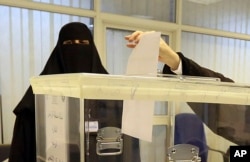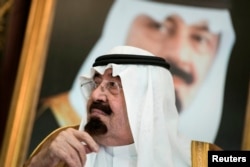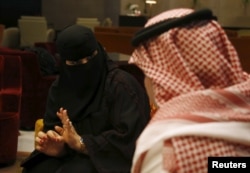Last week, 21 women won seats in city councils across Saudi Arabia in the country's first election open to female voters and candidates. Many Western analysts view the recent inclusion of women in Saudi municipal elections with skepticism, while their counterparts in the kingdom view it as an important milestone in the slow but steady progress of women.
“It is symbolic that women have been put on the stage and asked to perform publicly, and that sends a very strong message on its own,” said Princess Basmah Bint Saud, daughter of former King Saud and granddaughter of the modern kingdom’s founder.
“I happen to see the elections as a very important step in an ongoing reform process that began in earnest shortly after the 1990 Gulf War,” said Saudi political analyst Fahad Nazer.
Even Saudi socio-political commentator Tariq Al-Maeena sees the vote as a landmark.
“As one who is usually critical, I do not think it was done to appease critics, but to follow the directives of the late King,” he said. “I believe that the tide for change was initiated during King Abdullah’s reign, and women’s empowerment has become a reality on many fields. This is one of them.”
In the latter years of his reign, King Abdullah set up a scholarship program that allowed men and women to study at foreign universities.
For women alone, he allowed entrance into traditionally male-only professions such as law, journalism or engineering, and appointed 30 women onto the Shura Council, the kingdom’s formal advisory body. He also named a woman to lead a new women’s affairs department within the education ministry.
Restrictive guardian system
But these recent gains aren't a first for Saudi women: Ten years ago, two women were voted onto the board of Jeddah’s chamber of commerce; one of them, Lama Al-Suleiman, won a seat on Jeddah’s council in last week’s vote.
Many women were impeded from running or voting because of Saudi Arabia’s guardian system, which requires women to gain approval of a male guardian, usually her father, husband, brother or son, to get a passport, travel, open a bank account, access higher education or marry.
About 130,000 women registered to vote, but only about 3,600 turned out to cast their ballots.
The roughly 900 women candidates were subject to rules that made campaigning challenging: Men and women were forbidden to mix at campaign headquarters. Women candidates were not allowed to publish photos of themselves, nor could they address voters directly.
Nazer points out a fact that many Western media outlets have ignored.
“The fact that 21 women actually won seats is a testament to the hard work that many Saudi women and men have put into raising awareness about the importance of participating in the elections and suggests that an institution that was once seen as alien or foreign to the Saudi political lexicon has garnered wide acceptance,” he said.
'Evolution, not revolution'
Al-Maeena believes the driving ban is the last major barrier facing women.
“I call it the stronghold of the fundamentalists. With the current conflicts going around, I’m not sure the government would want to advance rights without facing possible censure from the right wing element.”
He said the guardianship system is being eased gradually.
“Just last week, new laws on this issue with regards to widows and divorced women were released. Traveling without permission is becoming a thing of the past as women are beginning to depend on themselves and services like Uber and Careem [chauffeur service] to get around,” said Al-Maeena.
A new law will allow widowed and divorced Saudi women to obtain family identity cards. That means that mothers will be able to register their children in school or obtain medical procedures that formerly required a guardian’s approval.
It’s a start in a process that clearly won’t happen in the blink of an eye.
“An ‘all or nothing’ approach to reform does not appeal to many Saudis, especially given the very difficult transition the so-called Arab Spring countries have undergone,” said Nazer. “The mantra that many reform advocates have adopted, ‘Evolution, not revolution,’ seems to resonate with a wide swath of Saudi society.”
Princess Basmah, who did not go out to vote herself, said change doesn’t just lie in the hands of men.
“There are a lot of other issues at hand: Families, traditions, even some women themselves. They have to get used to change,” she said. “You don’t just hand somebody a parachute and tell them to jump.”







